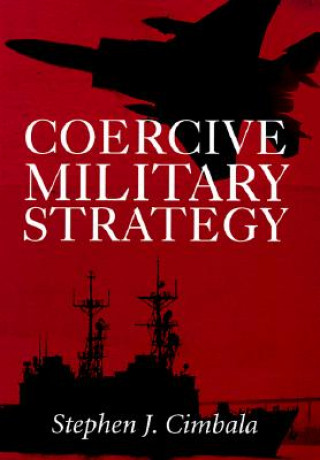
Doručení
Nákupní rádce





Nehodí se? Vůbec nevadí! U nás můžete do 30 dní vrátit
 Dárkový poukaz
V libovolné hodnotě
Dárkový poukaz
V libovolné hodnotě
S dárkovým poukazem nešlápnete vedle. Obdarovaný si za dárkový poukaz může vybrat cokoliv z naší nabídky.
Coercive Military Strategy
 Angličtina
Angličtina
 161 b
161 b
30 dní na vrácení zboží
Mohlo by vás také zajímat


Coercion is persuasion supported by the threat or use of force. Just as warfare is often "diplomacy carried out by other means", coercion -- the threat of combat or the threat of an escalation in the intensity of combat -- is a more subtle method of dispute that shades the spectrum between diplomacy and warfare. Understanding of coercive military strategy is a prerequisite to the successful making of either policy or war.In Coercive Military Strategy, Stephen J. Cimbala shows that coercive military strategy is a necessary part of any diplomatic-strategic recipe for success. Few wars are total wars, fought to annihilation, and military power is inherently political, employed for political purpose, in order to advance the public agenda of a state, so in any war there comes a time when a diplomatic resolution may be possible. To that end, coercive strategy should be flexible, for there are as many variations to it as there are variations in wars and warfare.Cimbala observes several cases of applying coercive strategy in the twentieth century: the U.S. strategy of limited war during the Cold War; the Cuban Missile Crisis, in which both the United States and the Soviet Union applied coercive strategy; Desert Storm, in which the Coalition Forces could practice coercion within the framework of large-scale, but limited, war; and the Vietnam War, in which U.S. coercive strategy was ultimately a failure.Additionally, Cimbala examines coercion and the theory of collective security, which implies a willingness on the part of individual states, such as the NATO nations, to combine against any aspiring aggressor.With his examples, and the arguments they illustrate, Cimbala shows thatalthough coercive strategy is a remedy for neither the ailments of U.S. national security nor world conflict, it will become more important in peace, crisis, and even war in the next century, when winning with the minimum of force or without force will become more important tha
Informace o knize
 Angličtina
Angličtina




 Jak nakupovat
Jak nakupovat





















